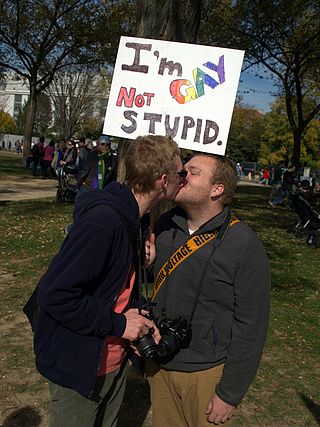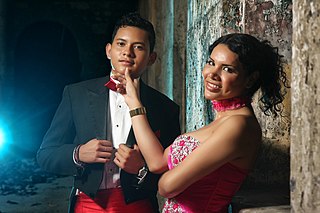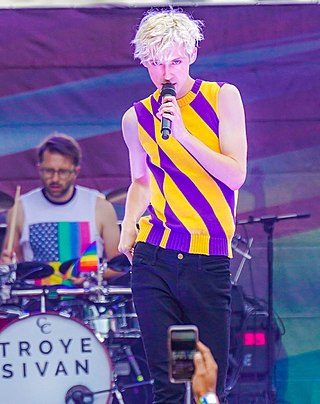Shemale is a term most commonly used in the pornography industry to describe trans women or other people with male genitalia and female secondary sex characteristics acquired via hormones or surgery. Many people in the transgender community consider the term offensive and degrading. Using the term shemale for a trans woman may imply that she is working in the sex trade.
LGBTQ slang, LGBTQ speak, queer slang, or gay slang is a set of English slang lexicon used predominantly among LGBTQ+ people. It has been used in various languages since the early 20th century as a means by which members of the LGBTQ+ community identify themselves and speak in code with brevity and speed to others. The acronym LGBT was popularized in the 1990s and stands for Lesbian, Gay, Bisexual, and Transgender. It may refer to anyone who is non-heterosexual or non-cisgender, instead of exclusively to people who are lesbian, gay, bisexual, or transgender. To recognize this inclusion, a popular variant, LGBTQ, adds the letter Q for those who identify as queer or are questioning their sexual or gender identity.

Frot or frotting is a sexual practice between men that usually involves direct penis-to-penis contact. The term was popularized by gay male activists who disparaged the practice of anal sex, but has since evolved to encompass a variety of preferences for the act, which may or may not imply particular attitudes towards other sexual activities. This can also be used as some type of foreplay.
Faggot, often shortened to fag in American usage, is a derogatory slur used to refer to gay men. In American youth culture around the turn of the 21st century, its meaning extended as a broader reaching insult more related to masculinity and group power structure.

Terms used to describe homosexuality have gone through many changes since the emergence of the first terms in the mid-19th century. In English, some terms in widespread use have been sodomite, Achillean, Sapphic, Uranian, homophile, lesbian, gay, effeminate, queer, homoaffective, and same-gender attracted. Some of these words are specific to women, some to men, and some can be used of either. Gay people may also be identified under the umbrella term LGBT.
Beard is a slang term, American in origin, describing a person who is used, knowingly or unknowingly, as a date, romantic partner, or spouse either to conceal infidelity or to conceal one's sexual orientation. The term also refers, in some areas, to anyone who acted on behalf of another, in any transaction, to conceal a person's true identity. The term can be used in heterosexual and non-heterosexual contexts but is especially used within LGBTQ+ culture. References to beards are seen in mainstream television and films, and other entertainment.
A chickenhawk or chicken hawk is slang used in American and British gay culture to denote older males who prefer younger males for partners, who may less often be called "chickens", i.e., the prey of the chickenhawk. Other variations include chicken queen and chicken plucker.

Sexual attraction to transgender people has been the subject of scientific study and social commentary. Psychologists have researched sexual attraction toward trans women, trans men, cross dressers, non-binary people, and a combination of these. Publications in the field of transgender studies have investigated the attraction transgender individuals can feel for each other. The people who feel this attraction to transgender people name their attraction in different ways.

Shiksa is an often disparaging, although not always, term for a gentile woman or girl. The word, which is of Yiddish origin, has moved into English usage and some Hebrew usage, mostly in North American Jewish culture.

In linguistics, reappropriation, reclamation, or resignification is the cultural process by which a group reclaims words or artifacts that were previously used in a way disparaging of that group. It is a specific form of a semantic change. Linguistic reclamation can have wider implications in the fields of discourse and has been described in terms of personal or sociopolitical empowerment.
Gay is a term that primarily refers to a homosexual person or the trait of being homosexual. The term originally meant 'carefree', 'cheerful', or 'bright and showy'.
Beaner is a derogatory slur originally from the United States to refer to individuals from Mexico or of Mexican American heritage. It originates from the bean being a staple ingredient in Mexican cuisine, such as Salsa Verde Soup or Bean Quesadilla.
Chicken can be used, usually by gay men referring to other gay men, to mean a young gay man or young-appearing gay man.
Fruit, fruity, and fruitcake, as well as its many variations, are slang or even sexual slang terms which have various origins. These terms have often been used derogatorily to refer to LGBT people. Usually used as pejoratives, the terms have also been re-appropriated as insider terms of endearment within LGBT communities. Many modern pop culture references within the gay nightlife like "Fruit Machine" and "Fruit Packers" have been appropriated for reclaiming usage, similar to queer.
Troll and trolling are slang terms used almost exclusively among gay men to characterize gay, bisexual and questioning or bi-curious men who cruise or "wander about looking" for sex or potential sex partners or experiences "in a notably wanton manner and with lessened standards of what one will accept in a partner." The term can be used positively or negatively depending on the speaker, usage and intent and can describe the person or the activity. Although often referring to "an unattractive older gay man" and although troll as a slur "is primarily a visual, not a behavioral" judgment, the phrases can be used for anyone who is trolling, regardless of the putative troll's age or perceived attractiveness.
Sexual slang is a set of linguistic terms and phrases used to refer to sexual organs, processes, and activities; they are generally considered colloquial rather than formal or medical, and some may be seen as impolite or improper.
In gay slang, queen is a term used to refer to a flamboyant or effeminate gay man. The term can either be pejorative or celebrated as a type of self-identification.

Twink is gay slang for a man who is usually in his late teens to twenties whose traits may include a slim to average physique, a youthful appearance, little or no body hair, and flamboyancy. Twink is used both as a neutral descriptor, which can be compared with bear, and as a pejorative.

Dyke is a slang term, used as a noun meaning lesbian. It originated as a homophobic slur for masculine, butch, or androgynous girls or women. Pejorative use of the word still exists, but the term dyke has been reappropriated by many lesbians to imply assertiveness and toughness.
"No homo" is a slang phrase used at the end of a sentence to assert the statement or action by the speaker had no intentional homosexual implications. The phrase is also "added to a statement in order to rid [oneself] of a possible homosexual double-entendre".






